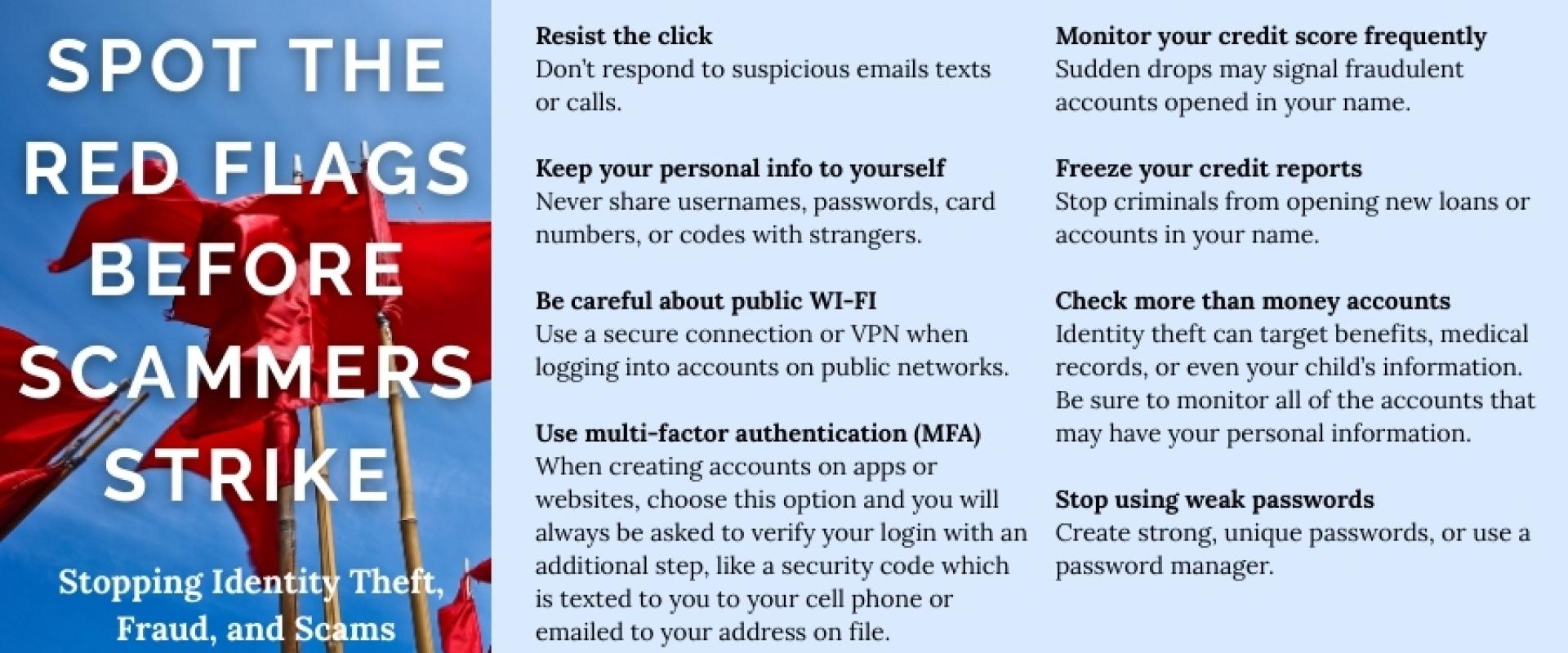Stop, Prevent & Report Financial Scams
From Chairman Dan Meuser — House Financial Services Subcommittee on Oversight & Investigations

Common scams — What they look like & how to avoid them:
Card, ACH & check fraud
Lost/stolen card numbers, counterfeit checks, “washed” checks from mailboxes, or unauthorized ACH. Use secure mail (or the post office); lock your mailbox, monitor accounts, set alerts, and report immediately.
Mortgage/loan relief & credit repair schemes
Upfront fees for “guaranteed” modifications, special programs, or removing accurate negatives from credit files. Work directly with your servicer and avoid upfront-fee offers.
Debt collection scams
Threats of arrest or legal action for debts you don’t recognize, demands for immediate payment, or refusal to provide a written validation notice. Ask for validation; don’t pay on the spot.
Investment & crypto scams
“Guaranteed” high returns, fake trading platforms, celebrity impersonations, or romance-turned-investment schemes. Be skeptical of pressure to move funds to new “safe” accounts or wallets.
Imposter & government-agency scams
Scammers pose as the IRS, Social Security, a bank, tech support, or even a relative (“grandparent scam”) to demand money or personal info urgently. Hang up; verify using official phone numbers/websites; never pay by gift card.
Relationship Investment scams
This can start with a simple text or DM. Scammers try to form a friendship with you — before offering a phony investment opportunity. Once the bait is taken, they vanish, along with your money. Ignore messages from anyone you don’t know and consider deleting or blocking them.
Financial exploitation
Unauthorized withdrawals, pressure to buy gift cards, “tech support” refunds, romance/inheritance scams. Talk to a trusted family member or banker; call the Elder Fraud Hotline.
Phishing
Fake emails, texts, or calls try to make you click links, download malware, or reveal credentials or codes. Don’t click; type the site yourself.
Quick links — Report fraud by type:
- Consumer/Internet/Mail/Tax Scams
Any scam, imposter, or unfair practice (consumer)
Internet/cyber-enabled crime (including crypto & BEC)
- Frauds and Scams Affecting Your Bank Accounts
Bank, mortgage, credit card, debt collection, money transfers, credit reporting issues Phone: 1-855-411-CFPB
- Investment Scams
SEC Tips/Complaints (TCR) webform
FINRA (broker/advisor issues) and Securities Helpline for Seniors®: 844-574-3577
- Help for Seniors
If you are a Senior or Caregiver, call the National Elder Fraud Hotline: 833-FRAUD-11 (833-372-8311).
Social Security scams or benefit fraud
Securities Helpline for Seniors®: 844-574-3577
- Help for Veterans
Mailers, texts, phonecalls or emails referencing legitimate programs like: CHAMPVA or TRICARE for Life
Scammers know that many veterans rely on monthly benefits and may be drawn to the promise of additional support. That’s why these schemes are so dangerous — and why awareness is critical.
Do not respond directly to mailers, emails, etc.
Verify any claims directly with the PA Department of Military and Veterans Affairs at 800-547-2838.
Accredited Veteran Service Officers: with the VA or a part of a Veteran Service Orginization like the VFW or the American Legion — available at no cost — can:
- Verify whether a program is legitimate
- Help you secure and protect your earned benefits
- Report fraudulent activity
- Provide guidance tailored to your situation
